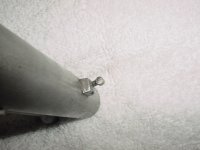Also in Italy we think the same

Other good choice is the two band enfield, but the more straigth stock of the enfield isn't good for everyone!
The so called "zouave" is really good for 3 simple reasons, (in my opinion) the short barrel and the shorter barrel time of the bullet that help in this slow velocity load, and a heavy barrel respect, for example, the two band enfield!
The hammer course isn't longer like sprigfield and so cause a faster time of ignition after trigger pulling, this help the precisione of the shot!
The best load for me is a charge of 43 grains of n2 swiss (FFFg) back a 640 grains miniè from Pedersoli mould, lubed with a mixture of beeswax, paraffin, pig fat and a drop of Lee liquid alox, the bullet must not require calibration in a sizer, it must fit well the bore and not be too loose, no corn or wad over powder (it's a miniè) the lead must be pure, or at least with 1 over 40 part of tin to lead alloy, this help when you make your bullet!
The original, if i remember right were made in 20'000 piece in 1863 and look like never issue to a fighting repart, were sold after the war to civilian owner, the original bore was of 7 rifles, the now made Armisport 7 rifles bore are made copying exactly an original that i personally handled, is in quasi mint condition and it's of guy that makes Italian muzzleload championship, the external barrel finish is satin finished for minimize the light reflection!
I shoot a 3 rifle bore, it's a very good shooter, many friends own 7 rifle and are pretty happy of it!
The zouave is the first musket replica ever made, from the late '60 and early '70 many Italian manufacturer made it, famous was Zoli, (i think the first) actually only Armisport and Euroarms have the zouave in catalog, but only armisport make the 7 rifle, i have see recently 2 Bernardelli mississipi rifle in a arms shop (similar to zouave) i don't know if berardelli makes zouave too!
Thats all i know about it

ciao
Rusty













